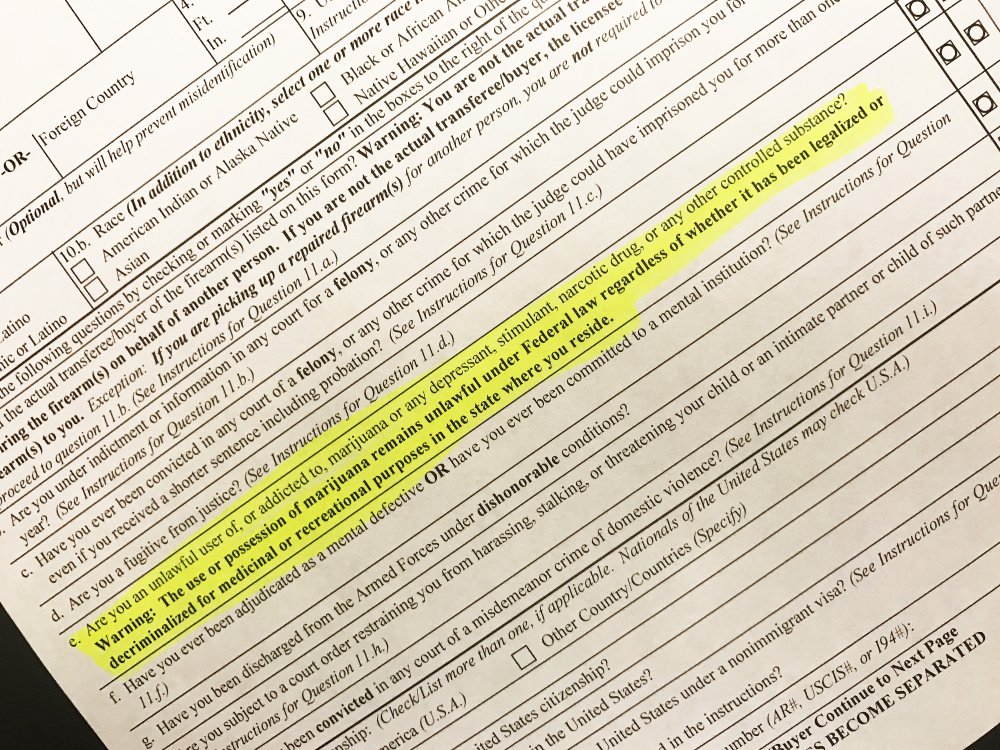The federal government is stepping up its efforts to keep guns out of the hands marijuana users, even as legal use of the drug is spreading around the country.
The Bureau of Alcohol, Tobacco, Firearms and Explosives long has prohibited gun and ammunition sales to unlawful users of marijuana, citing a risk of “irrational or unpredictable behavior.” Now, the federal agency has added a warning to Form 4473 making it clear to anyone applying for a permit to buy a gun that marijuana remains illegal under federal law and using it means you cannot buy a gun, despite laws in Maine and a growing number of other states that allow medical and recreational use of the drug.
The new language, added last week to forms filled out by gun buyers in Maine and nationwide, has raised concerns that the government is unfairly denying cannabis users their Second Amendment right to bear arms. And it has renewed calls from medical and recreational marijuana advocates for a change in federal law to catch up with the country’s changing views on marijuana.
Maine is a state with a deep tradition of gun ownership. More than half of Maine adults – 55 percent – surveyed in a Portland Press Herald poll of voters last October said they owned at least one gun.
Maine also is one of 28 states that allows medicinal use of pot, and tens of thousands of Mainers have received doctors’ certificates to use the drug. It is one of eight states plus the District of Columbia that have voted to legalize recreational use by adults 21 and older. Recreational use becomes legal in Maine on Monday.
However, the federal government classifies marijuana as a Schedule I drug, putting it in the same category as heroin, LSD and ecstasy. Marijuana users who lie on the form and deny cannabis use, whether for medicinal use or not, could face federal charges. Lying on a federal gun purchase form is a felony punishable by up to five years in prison.
Question 11e on Form 4473 – which asks if the buyer is “an unlawful user of, or addicted to, marijuana … or any other controlled substance?” – now has a warning printed below it in bold type that states: “The use or possession of marijuana remains unlawful under Federal law regardless of whether it has been legalized or decriminalized for medicinal or recreational purposes in the state where you reside.”
COURT UPHOLDS ATF’S POSITION
While the federal government has so far taken a hands-off approach to states that allow recreational or medicinal use of the drug, the new language on gun purchase forms is intended to send a clear message that the permissive attitude does not extend to gun ownership.
“It’s really a ‘Guys, we mean it’ kind of statement,” David Boyer, who managed the campaign to legalize recreational marijuana in Maine, said of the revision. “It is putting a lot of people in an uncomfortable position by either not letting them own a gun for hunting or self-defense, or lying so they can have a gun for protection or hunting.”
Form 4473 is updated every couple of years. The timing of the new warning on the form is not related to the transfer of power in Washington, D.C., although it comes as marijuana legalization advocates around the country watch to see if the Trump administration will take a more hostile approach to their movement.
The revision was intended to make it clear to individuals who are completing Form 4473 that federal law does not recognize the state issuance of medical marijuana cards, said Christopher Arone, a special agent and public information officer for the ATF Boston Field Division. The warning also applies to non-medicinal marijuana use by adults in states like Maine.
Federal law prohibits gun purchases by an “unlawful user and/or an addict of any controlled substance,” a provision of the Gun Control Act of 1968. The ATF clarified in a 2011 memo to gun dealers that the law applies to marijuana users regardless of whether the state in which they live has passed legislation allowing marijuana use for medicinal purposes. The ATF had told gun sellers they can assume a person with a medical marijuana card uses the drug, and therefore is not qualified to purchase a gun.
The ATF’s position was recently upheld in federal court.
The 9th U.S. Circuit Court of Appeals ruled last August that the ban on sales of guns to medical marijuana card holders does not violate the Second Amendment. The court ruled that Congress reasonably concluded that marijuana “raises the risk of irrational or unpredictable behavior with which gun use should not be associated.” The court also concluded that it’s reasonable for regulators to assume medical marijuana card holders use marijuana.
While the prohibition is difficult to enforce and there is no drug-testing required when purchasing a gun, a gun owner could be charged with falsifying the form if the ATF later learns that he or she is a medicinal or recreational user.
NO REGISTRATION IN MAINE
Unlike in some states, Mainers who become certified as medical marijuana patients do not have to register with the state, so there is no central database that could be used to screen whether a gun purchaser should be disqualified. More than 35,000 medical marijuana certificates had been distributed by Maine doctors as of last year, according to the state, but that number includes duplicate and replacement certificates, and is likely higher than the actual number of patients at the time.
Advocates say the federal government is unfairly casting marijuana as a more dangerous substance than it is, and wrongly concluded that marijuana users cannot safely use guns when not intoxicated. They say marijuana users are being deprived of a constitutional right and are pushing for the federal government to reschedule marijuana or legalize it entirely to resolve issues like this.
“Maine is known for hunting and we have remote areas where people need (guns) for security,” said Catherine Lewis, a board member of Medical Marijuana Caregivers of Maine. “It’s Catch-22. As American citizens and residents of Maine, we have the right to protect ourselves. There have been instances of home invasions where people have felt the need for protection. To say they cannot possess a firearm for their own protection is really wrong of the federal government.”
Lewis said the trade group frequently encounters questions about firearms during educational sessions it offers to new patients and caregivers. Before the Form 4473 revision, Lewis and others with the group told people they had to determine for themselves how to answer the question. Some medical marijuana users in Maine feel they are legally using the substance and are not addicted and answer with that in mind, she said.
“They had to determine if they were illegally using or addicted (to marijuana) to answer lawfully,” Lewis said.
The change in the form has not been widely publicized and many patients may not yet know about the warning. But as patients and other marijuana users become aware of the language added to the form, there is likely to be strong reaction from Mainers who hunt or use guns for protection, Lewis said.
“I think there will be a huge outcry, as there should be,” she said. “One by one our constitutional rights are being stripped from the American people.”
POSITIONS OF ADVOCACY GROUPS
The National Organization for the Reform of Marijuana Laws, a Washington, D.C.-based nonprofit, disputes the government’s position that marijuana users cannot safely use guns and believes that responsible cannabis users should be afforded the same legal rights and protections as other citizens.
“This is an affront to our constitutional rights and hopefully other Second Amendment groups will stand with us in calling for an end to this practice, but it will likely require the rescheduling of marijuana by Congress,” Erik Altieri, executive director of NORML, said in an email.
The National Rifle Association has not gone on the record with a position on either the 9th District Court of Appeals ruling or the revision to Form 4473. The national organization did not respond to a request for comment this week.
David Trahan, executive director of the Sportsman’s Alliance of Maine, declined to discuss concerns about marijuana users and Second Amendment rights. But he said the issue of marijuana users being banned from buying guns “illustrates the conflict between the federal government and the states’ sovereign right to self-govern.”
“It’s going to take some time to work through this policy. Whether or not the federal government agrees with the legalization of marijuana, the more states that do it, the more the people are affected by it,” he said. “They’re going to have to deal with it at the federal level, whether they like it or not.”
Gillian Graham can be contacted at 791-6315 or at:
Twitter: grahamgillian
Correction: This story was revised at 12:35 p.m., Jan. 27, 2017, to correctly spell the name of Christopher Arone, a special agent and public information officer for the ATF Boston Field Division.
Send questions/comments to the editors.





Comments are no longer available on this story